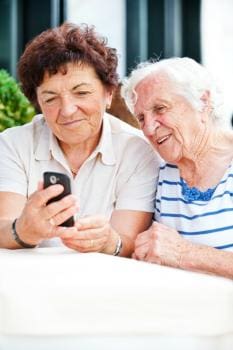Welcome to Alicia’s monthly advice column where she’ll provide tips on caring for a loved one with dementia. Alicia Seaver is the Director of Memory Care at Bridges® by EPOCH and is a certified memory impairment specialist. This month’s topic is utilizing technology in caregiving.
Technology isn’t just something for younger generations to get excited about — recent innovations have led to the creation of powerful tools for senior care, and caregivers are taking note. According to a 2016 AARP study, over half of all caregivers use technology to assist with their caregiving duties, and 43 percent of caregivers want to use it even more. On top of saving caregivers time and money, the right tools can help reduce caregiver stress, making it easier to manage care logistics and complete tasks more efficiently. They can also be excellent educational resources, offering practical solutions to the challenges caregivers face. The following are some of the most popular technological tools caregivers are using today.
Health tracking tools
Caring for a loved one means keeping track of their medical history, medications and other treatments, as well as insurance, appointments and more. Health tracking tools allow caregivers to track all this information in one location, making it easier to collaborate with your loved one’s providers. HealthVault is one free health tracking system that organizes health information and allows it to be easily shared with others.
Caregiver coordination systems
In addition to tracking health information, caregivers have to plan and coordinate their caregiving duties along with their other personal responsibilities. Caregiver coordination systems digitally store appointments, reminders and schedules in one calendar. They also allow friends and family members to join the calendar and sign up as helpers when the caregiver is unavailable or needs time off. CareZone is a free app with a shareable calendar, to-do list and journal so everyone involved in a person’s care can easily share responsibilities and important information with one another.
Medication reminders
While caregivers often manage their loved one’s medication regimen, medication reminder systems can help ensure your loved one stays consistent and provide instructions on how to take the medication. Some of these systems will even notify caregivers if medication was not taken within a certain timeframe. TabSafe and MedMinder offer all these features, and the free app MedCoach sends medication reminders directly to seniors’ tablets and mobile devices.
Online support
Technology provides caregivers and their loved ones with useful tools to track health information, coordinate care and monitor medications, but technology can also be used to give caregivers the support and community they need. With the click of a mouse, caregivers can connect with their peers and have a safe place to share their thoughts and feelings with others, reducing feelings of isolation and loneliness. These online communities can also serve as a forum to discuss care methods, challenges, and to give and receive advice. Through the Alzheimer’s Association and the National Center on Caregiving, caregivers can connect with peers both online and offline. Caregivers can also find support groups through social media platforms like Facebook.
The caregiver role is a challenging one, but there are numerous technologies available to ease the stress of caring for a loved one. If you have questions about technological tools for caregivers, please feel free to reach out to me. And if you’re looking to connect with a caregiver support group, I encourage you to join one of our monthly groups at Bridges by EPOCH.



